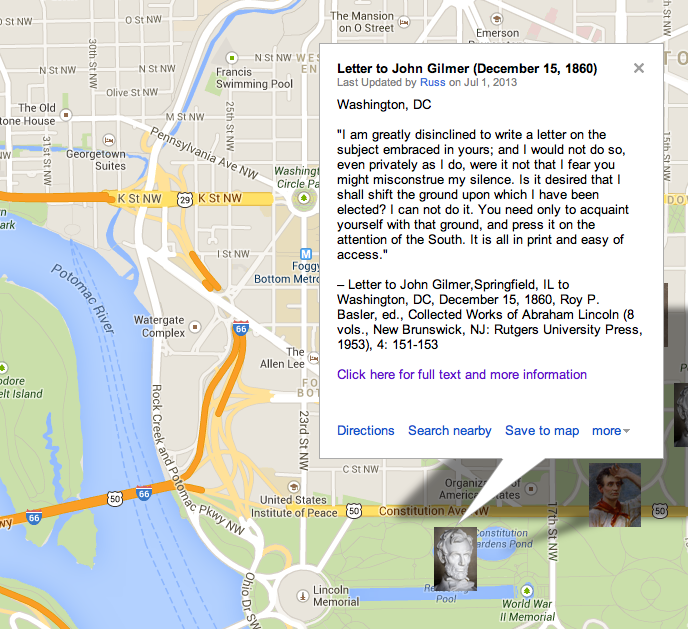Contributing Editors for this page include Susan Williams Phelps
Ranking
#109 on the list of 150 Most Teachable Lincoln Documents
Annotated Transcript
“May I be pardoned if I ask whether even you have ever attempted to procure the reading of the Republican platform, or my speeches, by the Southern people? If not, what reason have I to expect that any additional production of mine would meet a better fate? It would make me appear as if I repented for the crime of having been elected, and was anxious to apologize and beg forgiveness.”
On This Date
HD Daily Report, December 15, 1860
The Lincoln Log, December 15, 1860
Close Readings
Susan Williams Phelps, “Understanding Lincoln” blog post (via Quora), August 26, 2013
Custom Map

View in Larger Map
How Historians Interpret
“Lincoln was doubtless correct in thinking that no statement would placate the Deep South. The editors of the Charleston Mercury had announced that even if he were “to come out and declare that he held sacred every right of the South, with respect to African slavery, no one should believe him; and, if he was believed, his professions should not have the least influence on the course of the South.”
–Michael Burlingame, Abraham Lincoln: A Life (2 volumes, originally published by Johns Hopkins University Press, 2008) Unedited Manuscript By Chapters, Lincoln Studies Center, Volume 1, Chapter 17 (PDF), pp. 1944
NOTE TO READERS
This page is under construction and will be developed further by students in the new “Understanding Lincoln” online course sponsored by the House Divided Project at Dickinson College and the Gilder Lehrman Institute of American History. To find out more about the course and to see some of our videotaped class sessions, including virtual field trips to Ford’s Theatre and Gettysburg, please visit our Livestream page at http://new.livestream.com/gilderlehrman/lincoln
Searchable Text
Strictly confidential.
Springfield, Ill.
Dec 15, 1860.
Hon. John A. Gilmer:
My dear Sir—
Yours of the 10th is received. I am greatly disinclined to write a letter on the subject embraced in yours; and I would not do so, even privately as I do, were it not that I fear you might misconstrue my silence. Is it desired that I shall shift the ground upon which I have been elected? I can not do it. You need only to acquaint yourself with that ground, and press it on the attention of the South. It is all in print and easy of access. May I be pardoned if I ask whether even you have ever attempted to procure the reading of the Republican platform, or my speeches, by the Southern people? If not, what reason have I to expect that any additional production of mine would meet a better fate? It would make me appear as if I repented for the crime of having been elected, and was anxious to apologize and beg forgiveness. To so represent me, would be the principal use made of any letter I might now thrust upon the public. My old record cannot be so used; and that is precisely the reason that some new declaration is so much sought.
Now, my dear sir, be assured, that I am not questioning your candor; I am only pointing out, that, while a new letter would hurt the cause which I think a just one, you can quite as well effect every patriotic object with the old record. Carefully read pages 18, 19, 74, 75, 88, 89, & 267 of the volume of Joint Debates between Senator Douglas and myself, with the Republican Platform adopted at Chicago, and all your questions will be substantially answered. I have no thought of recommending the abolition of slavery in the District of Columbia, nor the slave trade among the slave states, even on the conditions indicated; and if I were to make such recommendation, it is quite clear Congress would not follow it.
As to employing slaves in Arsenals and Dockyards, it is a thing I never thought of in my life, to my recollection, till I saw your letter; and I may say of it, precisely as I have said of the two points above.
As to the use of patronage in the slave states, where there are few or no Republicans, I do not expect to inquire for the politics of the appointee, or whether he does or not own slaves. I intend in that matter to accommodate the people in the several localities, if they themselves will allow me to accommodate them. In one word, I never have been, am not now, and probably never shall be, in a mood of harassing the people, either North or South.
On the territorial question, I am inflexible, as you see my position in the book. On that, there is a difference between you and us; and it is the only substantial difference. You think slavery is right and ought to be extended; we think it is wrong and ought to be restricted. For this, neither has any just occasion to be angry with the other.
As to the state laws, mentioned in your sixth question, I really know very little of them. I never have read one. If any of them are in conflict with the fugitive slave clause, or any other part of the constitution, I certainly should be glad of their repeal; but I could hardly be justified, as a citizen of Illinois, or as President of the United States, to recommend the repeal of a statute of Vermont, or South Carolina.
With the assurance of my highest regards I subscribe myself
Your obt. Servt.,
A. LINCOLN

